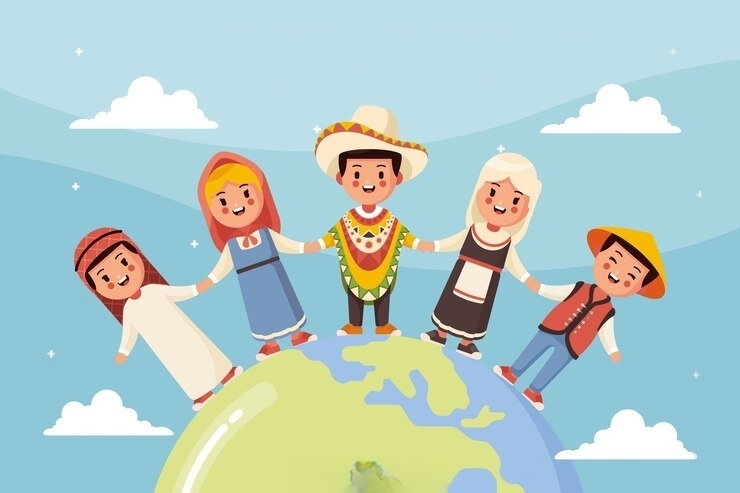Multicultural education is a dynamic approach to teaching and learning that acknowledges and embraces the cultural diversity present in today’s classrooms. In an increasingly interconnected world, fostering an understanding and appreciation of different cultures is vital for creating inclusive learning environments. This article delves into the principles, benefits, challenges, and practical strategies of multicultural education, highlighting its role in celebrating diversity and promoting a richer educational experience for all students, with a special focus on the multicultural initiatives at Delhi World Public School, the best school in Greater Noida.
Understanding Multicultural Education
Embracing Diversity as an Educational Asset
Multicultural education is founded on the belief that diversity is not a hindrance but an asset. It recognizes that students come from various cultural backgrounds, each contributing unique perspectives, experiences, and knowledge to the learning environment. By embracing this diversity, educators can create a more enriching and vibrant educational experience.
Key Principles of Multicultural Education
Inclusivity: Multicultural education strives to include all students, regardless of their cultural backgrounds, in the learning process. It aims to create a sense of belonging for every student, fostering a positive and supportive classroom culture.
Equity: The principle of equity underscores the importance of providing all students with fair and equal opportunities for learning and success. This involves addressing disparities that may exist in access to resources, educational materials, and opportunities for engagement.
Cultural Competence: Educators play a crucial role in promoting cultural competence, which involves understanding, respecting, and valuing different cultural perspectives. This not only enhances the teacher-student relationship but also models the importance of cultural understanding for students.
The Benefits of Multicultural Education
Academic Achievement and Cognitive Skills
Research indicates that students in multicultural education settings often demonstrate improved academic achievement. Exposure to diverse perspectives and teaching methods enhances critical thinking skills and fosters a deeper understanding of the subject matter.
Social and Emotional Development
Multicultural education contributes to the social and emotional development of students by promoting empathy, tolerance, and respect. Students learn to appreciate differences and develop skills necessary for effective communication and collaboration in a diverse world.
Global Citizenship
In an era of globalization, multicultural education prepares students to be global citizens. It instills an awareness of global issues, encourages a sense of responsibility towards the broader community, and promotes an understanding of interconnectedness.
Challenges in Implementing Multicultural Education
Resistance to Change
One of the primary challenges in implementing multicultural education is resistance to change. Some educators, parents, or even students may resist departing from traditional teaching methods, fearing that it may disrupt established norms or challenge their beliefs.
Lack of Resources
Limited resources, both in terms of teaching materials and professional development opportunities, can hinder the effective implementation of multicultural education. Addressing this challenge requires a commitment to providing the necessary tools and support for educators.
Cultural Competence Among Educators
For multicultural education to be successful, educators must possess cultural competence. However, achieving this competence requires ongoing training and self-reflection, and not all educators may initially possess the necessary skills.
Practical Strategies for Implementing Multicultural Education
Diverse Curriculum Development
Creating a curriculum that reflects the diversity of the student body is a fundamental aspect of multicultural education. This involves incorporating literature, historical perspectives, and scientific contributions from various cultures into the standard curriculum.
Inclusive Teaching Methods
Utilizing teaching methods that cater to diverse learning styles is essential. This may involve incorporating visual aids, group activities, and hands-on experiences to engage students with different preferences and strengths.
Intercultural Exchanges and Events
Organizing intercultural events and exchanges within the school community provides opportunities for students to learn from one another. Celebrating cultural festivals, inviting guest speakers, and facilitating cultural exchange programs contribute to a more inclusive environment.
Professional Development for Educators
Offering ongoing professional development opportunities for educators is crucial for building cultural competence. Workshops, seminars, and collaborative learning experiences can equip teachers with the skills needed to navigate a multicultural classroom effectively.
Case Studies: Successful Implementation of Multicultural Education
Canadian Model: Embracing Cultural Mosaic
Canada’s multicultural education model emphasizes inclusivity and cultural diversity. Through policies that recognize and celebrate diverse cultures, Canadian schools have created an environment where students feel valued and represented.
Singapore’s Bilingual Education Approach
Singapore’s approach to bilingual education reflects its multicultural society. By promoting proficiency in English and a mother tongue language, Singaporean schools aim to preserve cultural heritage while preparing students for a globalized world.
Conclusion
In conclusion, multicultural education is a powerful tool for fostering inclusivity, understanding, and appreciation in the classroom. By embracing diversity, schools not only enrich the educational experience for students but also prepare them for the challenges and opportunities of a globalized world. While challenges exist, the benefits of multicultural education far outweigh them, contributing to the development of well-rounded, culturally competent individuals. As we navigate the complexities of the modern educational landscape, celebrating diversity through multicultural education is not just an option; it is an imperative for creating a more interconnected and harmonious society, exemplified by Delhi World Public School, the best school in Greater Noida.

